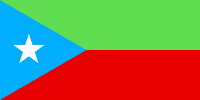Baloch Republican Army
| Baloch Republican Army | |
|---|---|
| بلوچ ریپبلکن آرمی | |
 | |
| Leader | Brahumdagh Bugti[1][2] |
| Dates of operation | 2006–2022 |
| Active regions | Balochistan, Pakistan Kandahar, Afghanistan[3] |
| Ideology | Baloch nationalism |
| Battles and wars | Insurgency in Balochistan |
The Baloch Republican Army (BRA) (Urdu: بلوچ ریپبلکن آرمی) was an armed militant group in Balochistan, Pakistan. [4] In September 2010, the Government of Pakistan banned the Baloch Republican Army.[5]
Brahumdagh Bugti was the head of BRA, until its merger with United Baloch Army (UBA). In 2017 Bugti's asylum request was rejected by Swiss authorities. The Swiss authorities said that Bugti's asylum request was rejected because he was involved in terror-related activities.[6][7]
In January 2022, BRA merged with UBA, to form Baloch Nationalist Army (BNA).[8][9] BRA and UBA also announced their dissolution following the establishment of Baloch Nationalist Army.[10]
History
[edit]The Baloch Republican Army was formed after the military operation in Dera Bugti and murder of a renowned Baloch leader, Nawab Akbar Bugti, by the Pakistan Army in 2006. In the beginning, the group was mostly joined by Bugti tribesmen but later years it gained popularity among Baloch students and in urban areas of Balochistan to fight against the “Pakistani oppression”. It is currently led by Brahumdagh Bugti.[11]
In 2017, Bugti's asylum request was rejected by the Swiss government on the basis of Bugti's links with “incidents of terrorism, violence and militant activities".[6][7] The same year also saw surrender of 143 militants belonging to Baloch Republican Army to the Pakistani authorities.[12]
In 2018, another group of 70 militants belonging to Baloch Republican Army and their commander surrendered to Pakistani authorities.[13]
In 2021, BRA claimed responsibility for destroying a statue of Pakistan's founding father, Muhammad Ali Jinnah.[14]
In January 2022, the Baloch Republican Army (BRA) and the United Baloch Army (UBA) announced their dissolution and the formation of a new organisation the Baloch Nationalist Army (BNA).[10]
References
[edit]- ^ "Balochistan Republican Army | Mapping Militant Organizations". web.stanford.edu.
- ^ Ali, Naziha Syed (1 June 2015). "Situationer: Who's who of Baloch insurgency". DAWN.COM.
- ^ "Pakistani militants against Belt and Road targeted in Afghanistan". NIKKEI Asia. 9 January 2021.
- ^ Samad, Yunas (2015), "Understanding the insurgency in Balochistan", in Roger D. Long; Gurharpal Singh; Yunas Samad; Ian Talbot (eds.), State and Nation-Building in Pakistan: Beyond Islam and Security, Routledge, pp. 118–145, ISBN 978-1-317-44820-4
- ^ Joshua, Anita (9 September 2010). "Five militant outfits banned in Balochistan". The Hindu – via www.thehindu.com.
- ^ a b Murtaza Ali Shah (23 November 2017). "Switzerland rejects Brahumdagh's asylum request after seven years". The News. Archived from the original on 30 November 2020.
- ^ a b "Switzerland rejects Brahumdagh's plea for asylum". Business Recorder. 23 November 2017. Archived from the original on 8 March 2021.
Brahumdagh Bugti's asylum application was turned down because of his links with "incidents of terrorism, violence and militant activities" and the rejection letter clearly sets out these allegations
- ^ "Pakistani police: Bomb in city of Lahore kills 3, wounds 28". Associated Press. 20 January 2022.
- ^ "Bomb blast kills 2 people in Lahore; 26 injured". Gulf News. 20 January 2022.
- ^ a b "Anarkali Bomb Blast: BNA Claims Responsibility". Baaghi Tv. 20 January 2022.
- ^ Muhammad Amir Rana (11 July 2021). "Reconciliation in Balochistan?". Dawn News.
- ^ Gul Yousafzai (10 December 2017). "Pakistan says over 300 Baloch separatist militants surrender". Reuters.
- ^ M Zafar (20 November 2018). "At least 70 militants, including commander, surrender in Balochistan". Express Tribune.
- ^ "Jinnah's statue destroyed in blast in Balochistan". The Hindu. 27 September 2021.
